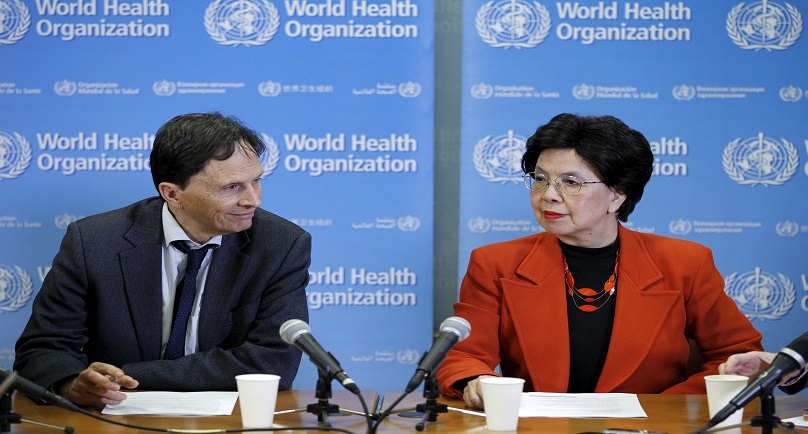Image: Professor David L. Heymann (L), Chair of the Emergency Committee, and World Health Organization (WHO) Director-General Margaret Chan hold a news conference after the first meeting of the International Health Regulations (IHR) Emergency Committee concerning the Zika virus and observed increase in neurological disorders and neonatal malformations in Geneva, Switzerland, February 1, 2016. REUTERS/Pierre Albouy
By Stephanie Nebehay and Ben Hirschler
GENEVA/LONDON (Reuters) – The World Health Organization has declared the mosquito-borne Zika virus to be an international public health emergency due to its link to thousands of suspected cases of birth defects in Brazil.
WHO Director-General Margaret Chan told reporters on Monday coordinated international action was needed to improve detection and speed work on a vaccine and better diagnostics for the disease, although curbs on travel or trade were not necessary.
The emergency designation was recommended by a committee of independent experts to the U.N. agency following criticism of a hesitant response so far. The move should help fast-track international action and research priorities.
“Members of the committee agreed that the situation meets the conditions for a public health emergency of international concern. I have accepted this advice,” Chan told a news briefing at WHO headquarters.
The WHO said last week the Zika virus, carried by the Aedes aegypti mosquito, was “spreading explosively” and could infect as many as 4 million people in the Americas. Brazil is due to host the Olympic Games in Rio de Janeiro in August.
The WHO was lambasted for reacting too slowly to the Ebola epidemic in West Africa which killed more than 10,000 people in the past two years, and has promised to do better in future global health crises.
U.S. Centers for Disease Control and Prevention head Thomas Frieden said the declaration “calls the world to action” on Zika, while Jeremy Farrar, director of the Wellcome Trust medical charity, said the
WHO “should be congratulated for being far more proactive this time”.
Derek Gatherer, a lecturer at Lancaster University, said the WHO’s move was “like a declaration of war … on Zika virus”.
UNDERDEVELOPED BRAINS
Brazil has reported some 3,700 suspected cases of microcephaly, in which infants are born with smaller-than-usual brains. The Health Ministry has linked the condition to Zika, although the connection is not yet definitive.
Chan said the causal link was “strongly suspected but not yet scientifically proven”.
Brazilian Health Minister Marcelo Castro told Reuters on Monday the epidemic was worse than believed because in 80 percent of cases the infected people had no symptoms.
As the virus spreads from Brazil, other countries in the Americas are also likely to see cases of babies with Zika-linked birth defects, experts believe.
The Pan American Health Organization says that Zika has now spread in 24 nations and territories in the Americas. In addition, the Zika virus infection was also reported late last year in Cape Verde.
The Zika virus has raised questions worldwide about whether pregnant women should avoid infected countries.
Chan said delaying travel was something pregnant women “can consider”, adding that if they needed to travel they should take protective measures by covering up and using mosquito repellent.
The clinical symptoms of Zika are usually mild and often similar to dengue, a fever which is transmitted by the same mosquito, leading to fears that Zika will spread into all parts of the world where dengue is commonplace.
More than a third of the world’s population lives in areas at risk of dengue infection, in a band stretching through Africa, India, Southeast Asia and Latin America.
Zika’s rapid spread in Latin America is put down to the prevalence of Aedes aegypti and a lack of immunity among the population.
White House spokesman Josh Earnest said one way for the United States to reduce the risk of Zika there would be to try to control the mosquitoes that carry it.
“At some point here … we’re going to see the temperatures rise (and) that will make for a more hospitable environment for mosquitoes,” he said. “We want to make sure that we have got a strategy to try to limit the spread of this disease when that happens.”
Georgetown University public health and law expert Lawrence Gostin, who last week called on the WHO to act urgently against Zika, welcomed Chan’s declaration but called for a proper strategy, adding: “Actions speak louder than words.”
“Without a clear strategy and ample resources, sounding an alert is simply not enough,” he said.
(Additional reporting by Kate Kelland in London, Roberta Rampton in Washington and Julie Steenhuysen in Chicago.; Editing by Alison Williams)
Copyright 2015 Thomson Reuters. Click for Restrictions.


